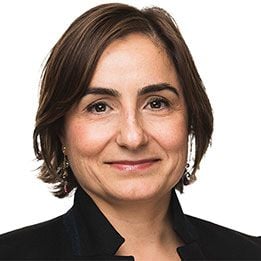
LB Private Equity Elite

Partner and GC | Apollo Global Management



Seda Yalçinkaya
Partner and GC | Apollo Global Management
Year of qualification: 2009
Columbia Law School, 1995-98
Cravath, Swaine & Moore, 1998-2005
Citi, 2005-11
Silver Lake, 2011-19
Apollo Global Management, 2019-present
I started my career at Cravath, Swaine & Moore in New York. It was a deliberate choice – I had thought I’d work somewhere more international, but ended up picking Cravath because of its reputation in dealmaking and M&A. Also, it famously has a rotation system where you move from practice to practice every 12-18 months. It meant you became a well-rounded lawyer.
While I was there, I worked on a seminal deal for IBM. I was advising one of the firm’s main clients on the sale of its laptop and desktop business to Chinese manufacturer Lenovo. It was the M&A deal of the year and it was career-changing for me.
I took the lead in a competitive sell-side process and I interacted with the IBM in-house legal team a lot. It gave me a window into what they did and what they were concerned about; the regulatory issues, the reputational issues, the integration, what happened next after a sale or acquisition. I liked being part of the continuum of where the business goes. This contributed to my decision to later join Citi in-house, after six years with Cravath.
At Citi in New York, I continued to work on strategic M&A transactions. But when I read about an interesting investment that Citi’s alternative investments business was making in Turkey (my home country), I saw an opportunity to focus my career on investments and deals and I raised my hand to ask if that business needed a lawyer.
It was a moment when the stars aligned. I worked with Citi Alternative Investments for four years, and then after the global financial crisis and the resulting changes in the banking sector, took a role as the European GC of US-based technology PE firm, Silver Lake. While I grew into my role there as both a transactional lawyer and regional GC for eight years, I also saw opportunities beyond ‘just PE’ for private capital. When I ultimately made the decision to join Apollo, I was attracted to its broader engagement across the capital structure, its growth strategy and its expansive view of private capital.
As GC – international for Apollo, my responsibilities cover all geographies in EMEA and Asia-Pacific and span transactional, regulatory, strategic, reputational and policy matters. Our business spans private credit, equity and real assets, and much of my and my team’s focus is devoted to supporting our deal teams originating transactions in all of these areas.
Many deals that fail or are abandoned come back in another guise a few years later. Therefore, institutional memory is important. And it does not hurt to have a good memory yourself – my memory is certainly not photographic, but I do seem to have a memory that retains a lot of detail.
Building institutional knowledge and memory starts with absorbing information from many sources at the firm and synthesising it at the institutional level. I enjoy seeing and hearing from all parts of the business – sometimes I liken myself to an octopus with many tentacles in lots of different places. You also need to be able to synthesise information at an institutional level and pass it back to external counsel and the internal deal team. My job essentially allows me to effectively act as a clearing house for our many varied activities and how they may relate to each other.
To be effective as an in-house legal leader, it is essential to find ways to build best practices and ways of preserving institutional knowledge to help deal professionals and other colleagues going into the future – and that appeals to my ‘organiser’ side.
In-house legal practice, especially at a place like Apollo, can be quite high-paced and intensive, but we have been very deliberate about maintaining diversity on our team. For example, it’s been a focus for me as a working mum to make it possible for other working mums to be on my team and be supported when they are away on or returning from maternity leave. Not every woman in my team is a mum but those who are, are highly supported. That’s important – we give them support and show them that their role is valued, that we want them to come back so we’re providing formal coverage for them while they’re away.
I think we’re doing a good job with diversity on the legal side, but we still need to make progress on the deal side. There’s definitely room for improvement. Organisations like Level20 are helpful – they track data [on female representation] and share it with participants; that supports the change we need to see. We need to keep pushing. If legal is a trailblazer, that’s great, but we need to do more in the rest of the business.